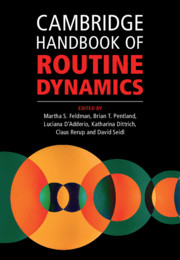Crossref Citations
This Book has been
cited by the following publications. This list is generated based on data provided by Crossref.
Bourret, Pascale
Castel, Patrick
Bergeron, Henri
and
Cambrosio, Alberto
2021.
Organizing precision oncology: introduction to the special issue.
New Genetics and Society,
Vol. 40,
Issue. 1,
p.
1.
Baldessarelli, Giada
Lazaric, Nathalie
and
Pezzoni, Michele
2022.
Organizational routines: Evolution in the research landscape of two core communities.
Journal of Evolutionary Economics,
Vol. 32,
Issue. 4,
p.
1119.
Jarzabkowski, Paula
Seidl , David
and
Balogun, Julia
2022.
From germination to propagation: Two decades of Strategy-as-Practice research and potential future directions.
Human Relations,
Vol. 75,
Issue. 8,
p.
1533.
Makowski, Piotr Tomasz
2022.
Routines: towards the Complexity of Organizational Intentionality.
Review of Philosophy and Psychology,
Vol. 13,
Issue. 4,
p.
1059.
Grandinetti, Roberto
2022.
A Routine-Based Theory of Routine Replication.
Sustainability,
Vol. 14,
Issue. 14,
p.
8254.
Brakemeier, Malte
Mahringer, Christian A.
and
Renzl, Birgit
2022.
Intrapreneurship.
p.
61.
Billinger, Stephan
Benincasa, Stefano
Baumann, Oliver
Kretschmer, Tobias
and
Schumacher, Terry R
2023.
Learning to search collaboratively: how dyads overcome complexity and misaligned incentives in imperfect modular decompositions.
Industrial and Corporate Change,
Vol. 32,
Issue. 1,
p.
208.
Addyman, Simon
2023.
Construction Project Organising.
p.
221.
Koumakhov, Rouslan
and
Marengo, Luigi
2023.
Organizational routines: between change and stability—Introduction to the special section.
Industrial and Corporate Change,
Vol. 32,
Issue. 6,
p.
1305.
Spencer, Bryan
Salvato, Carlo
and
Rerup, Claus
2023.
Routine regulation as a source for managing conflict within alliances: an integrative framework.
Industrial and Corporate Change,
Vol. 32,
Issue. 6,
p.
1333.
Balzarin, Lisa
2023.
New Perspectives in Network Studies.
p.
143.
Galdames-Calderón, Marisol
2023.
Distributed Leadership: School Principals’ Practices to Promote Teachers’ Professional Development for School Improvement.
Education Sciences,
Vol. 13,
Issue. 7,
p.
715.
Dosdall, Henrik
and
Löckmann, Teresa
2023.
Exploring Terrorism Prevention: An Organizational Perspective on Police Investigations.
Journal of Organizational Sociology,
Vol. 1,
Issue. 1,
p.
47.
Maag Merki, Katharina
Wullschleger, Andrea
and
Rechsteiner, Beat
2023.
Adapting routines in schools when facing challenging situations: Extending previous theories on routines by considering theories on self-regulated and collectively regulated learning.
Journal of Educational Change,
Vol. 24,
Issue. 3,
p.
583.
Lindebaum, Dirk
Moser, Christine
Ashraf, Mehreen
and
Glaser, Vern L.
2023.
Reading The Technological Society to Understand the Mechanization of Values and Its Ontological Consequences.
Academy of Management Review,
Vol. 48,
Issue. 3,
p.
575.
Mirc, Nicola
Sele, Kathrin
Rouzies, Audrey
and
Angwin, Duncan N.
2023.
From Fit to Fitting: A routine dynamics perspective on M&A synergy realization.
Organization Studies,
Vol. 44,
Issue. 9,
p.
1465.
Kesting, Peter
2023.
(Ex)Change of Routines: An Action-Based Microfoundation.
Schmalenbach Journal of Business Research,
Vol. 75,
Issue. 2,
p.
173.
Splitter, Violetta
Dobusch, Leonhard
von Krogh, Georg
Whittington, Richard
and
Walgenbach, Peter
2023.
Openness as Organizing Principle: Introduction to the Special Issue.
Organization Studies,
Vol. 44,
Issue. 1,
p.
7.
Lepratte, Leandro
and
Yoguel, Gabriel
2023.
Artefacts, routines, and co-production: a pioneering case of artificial intelligence-based health services in Argentina.
Industry and Innovation,
Vol. 30,
Issue. 9,
p.
1190.
Lepratte, Leandro
and
Yoguel, Gabriel
2024.
Co-production, artificial intelligence and replication: the path of routine dynamics.
Review of Evolutionary Political Economy,
Vol. 5,
Issue. 3,
p.
535.



